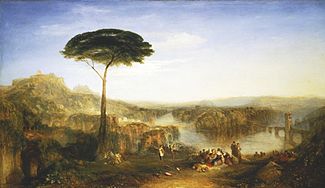TEXT ANALYSIS : ONCE MORE UPON THE WATERS
Fragments from CHILDE HAROLD’S PILGRIMAGE , Canto III , lines 5-18; 109-117; 127 -144
The lines below from Byron’s Childe Harold’s Pilgrimage provide an insight into the wild beauty of Nature and the Romantic themes of solitude, melancholy and the transcience of life.

LINES 5 - 18
Awaking with a start,
The waters heave around me; and on high
The winds lift up their voices: I depart,
Whither I know not; but the hour’s gone by,
When Albion’s lessening shores could grieve or glad mine eye.
Once more upon the waters! Yet once more!
And the waves bound beneath me as a steed
That knows his rider. Welcome to their roar!
Swift be their guidance, wheresoe’er it lead!
Though the strain’d mast should quiver as a reed,
And the rent canvas fluttering strew the gale,
Still must I on; for I am as a weed,
Flung from the rock, on Ocean’s foam, to sail
Explanation
(First person narrator)
Childe Harold is going to sail for a new journey, he doesn’t really know where he is going nor why. All around him the rough ocean roars and strong winds blow. He says he can’t feel joy nor sadness leaving his country, England (Albion), as it used to occur to him in the past (“ ...but the hour’s gone by, when Albion’s lessening shores could grieve or glad mine eye”.)
He is not worried nor frightened by the ocean: those waves are familiar to him (“as a steed who knows his rider” – lines 6-7). Even if the weather was worse than that and there was a storm (“though the strain’d mast should quiver as a reed, and the rent canvas fluttering strew the gale”), yet he would go on, he would leave, because he feels forced by a natural impulse, stronger than his will (“ for I am as a weed flung from the rock…”).
Themes
No real aim but escapism; melancholy; wild natural environment (the ocean) as a mirror of the protagonist’s tormented soul.
LINES 109 – 117
Explanation
(Third person narrator)
The journey goes on and Childe Harold seems to feel at home in solitary, exotic and extreme places: “the desert, forest, cavern, breaker’s foam were unto him companionship”. They speak a mutual language , clearer to him than his mother-toungue, than the language of books, which he willingly leaves apart to learn from “Nature’s pages” .
Themes
Wild nature as the ideal place for the Byronic hero; true knowledge of himself not through books but in Nature.
But in Man’s dwellings he became a thing
Restless and worn, and stern and wearisome,
Droop’d as a wild-born falcon with clipt wing,
To whom the boundless air alone were home:
Then came his fit again, which to o’ercome,
As eagerly the barr’d-up bird will beat
His breast and beak against his wiry dome
Till the blood tinge his plumage , so the heat
Of his impeded soul would through his bosom eat.
Explanation
While Childe Harold’s feels at home in wild natural environments, he feels “restless and worn, and stern and wearisome” in “Man’s dwellings”, that is to say in society, in other people’s company. He feels like a wild – born falcon, used to infinite skies, suddenly imprisoned in a cage, with broken wings. The imprisoned bird is ready to die to let his soul – at least – be free.
Themes
The Byronic hero as an outcast in society; refusal of social rules and conventions (wiry dome = a cage, a prison)
LINES 136 – 144
Self-exiled Harold wanders forth again,
With nought of hope left, but with less of gloom;
The very knowledge that he lived in vain,
That all was over on this side the tomb,
Had made Despair a smilingness assume,
Which, though 'twere wild, - as on the plundered wreck
When mariners would would madly meet their doom
With draughts intemperate on the sinking deck -
Did yet inspire a cheer, which he forbore to check.
Explanation
Childe Harold goes on wandering about with no certain destination. He has no hope left . He has not found any answer to his restlessness during his “pilgrimage”, but he is now aware that he has lived in vain and that death will put an end to everything (“all was over this side the tomb”). Now the “smilingness assume” (his initial melancholic mood) has turned to despair. Anyway, this desperation, which is the only certainty he owns, inebriated him and he goes madly towards his doom (like drunk mariners on a sinking ship).
Themes
The transcience of human life; the solitude of the Byronic hero.
 |
| Childe Harold's Pilgrimage by J.M.W.Turner (1823) |
N.B. The poem has four cantos written in Spenserian stanzas, which consist of eight iambic pentameter lines followed by one alexandrine (an iambic exameter), and has rhyme pattern ABABBCBCC.
Other posts about Byron: Byron in Italy
No comments:
Post a Comment